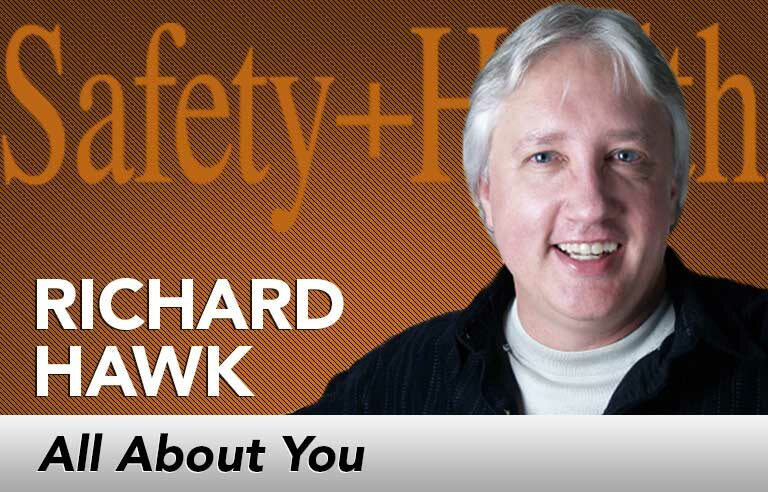All About You: Avoiding negative thoughts

EDITOR’S NOTE: Motivating employees to work safely is part of the safety professional’s job. But who motivates the motivator? In this monthly column, veteran safety pro and professional speaker Richard Hawk offers his entertaining brand of wisdom to inspire safety pros to perform at their best.
“Garbage in, garbage out” became a common computing term after it appeared in a syndicated newspaper article in April 1963. It’s a pithy way to describe a truth about programming: What you put in a program determines what it will spit out. The same thing applies to our mind. The well-known speaker Zig Ziglar said that when it comes to what we put in our minds, it’s actually “garbage in, garbage stays in.” How true.
Whether it’s a colleague complaining, a hostile driver who honks his horn at us or a news report about a horrible act, negative events affect us. So do negative thoughts. Both have an impact on our mental well-being.
We can’t keep all the “garbage” away – that would give us a false sense of reality and could even be dangerous. Nor can we expect to never have negative thoughts, as many of them just pop up unexpectedly. But there are things we can do to counteract and reduce the garbage that can hurt our happiness. Here are three tactics I use that have been a grand blessing. I’m sure (unless you are using them already) they will help make a positive difference in your life too:
Cut back on the “news” you watch and read
You will probably never have your picture posted on several news sites or have your name called out as a leading news story across the country. Do you know why? It’s because you’re like most people – a decent person who isn’t going to commit a sensational crime. You wouldn’t think that was the case if you watch the nightly news or review a major news site. Most of the people featured have done (or are accused of doing) something nasty.
Of course, not all news sources are negative. Some are even helpful. But in general, as Rolf Dobelli writes in “The Art of Thinking Clearly” (a book I highly recommend), “News is to the mind what sugar is to the body: appetizing, easy to digest – and highly destructive to the mind.”
Look for the positive in other people and situations
For safety and health professionals, this suggestion can be tough to follow at times because part of our job is to suggest ways people can improve their behavior and notice what’s wrong. Still, that doesn’t prevent us from focusing on the positive things about what goes on around us. When your mind is focusing on the positive, there is less room for negative or depressing thoughts.
For example, I often go through airport security checkpoints. When I noticed I was getting more disturbed about it, I started changing what I noticed and focused on the positive things about the experience, such as the variety of faces and colorful clothes. Of course, I would rather not go through a security checkpoint, but I don’t mind it anymore. In fact, during my last trip, I had a good laugh with the TSA agents about some of my unusual speaking props!
Practice being grateful
One book that helped me be more grateful, “The Progress Paradox: How Life Gets Better While People Feel Worse” by Gregg Easterbrook, is not a “happy” book. But it was an eye-opener, especially the parts that describe how much we have to be thankful for today. We’re blessed beyond measure. And now that I make it a point to regularly remind myself of the things I have to be grateful for (such as the privilege to share my ideas with you!), the garbage has a harder time getting in.
 Richard Hawk helps companies around the world create more vibrant safety cultures by showing them how to make safety fun. As a professional speaker, author and musician, he also inspires employees to focus better and enlightens safety leaders about ways to increase their influence. To learn more about Richard, visit www.makesafetyfun.com.
Richard Hawk helps companies around the world create more vibrant safety cultures by showing them how to make safety fun. As a professional speaker, author and musician, he also inspires employees to focus better and enlightens safety leaders about ways to increase their influence. To learn more about Richard, visit www.makesafetyfun.com.
Post a comment to this article
Safety+Health welcomes comments that promote respectful dialogue. Please stay on topic. Comments that contain personal attacks, profanity or abusive language – or those aggressively promoting products or services – will be removed. We reserve the right to determine which comments violate our comment policy. (Anonymous comments are welcome; merely skip the “name” field in the comment box. An email address is required but will not be included with your comment.)


